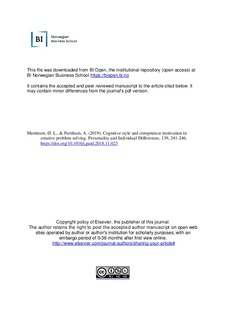Cognitive style and competence motivation in creative problem solving
Journal article, Peer reviewed
Accepted version
Permanent lenke
http://hdl.handle.net/11250/2612561Utgivelsesdato
2019Metadata
Vis full innførselSamlinger
- Publikasjoner fra CRIStin - BI [1015]
- Scientific articles [2181]
Originalversjon
Personality and Individual Differences. 2019, 139 241-246. 10.1016/j.paid.2018.11.023Sammendrag
This study was conceived by the idea that there exist different kinds of cognitive style-based, task competencies that have implications for task motivation and cognitive performance on creative problem-solving tasks/insight. Specifically, the relationships among the Assimilator–Explorer styles (Kaufmann, 1979), experimentally manipulated task competence for each style, and performance on insight tasks was examined. A total of 264 participants with a mean age of 17.4 years completed a cognitive style test, two measures of task motivation, and three practical construction-type insight tasks. Explorers with experimentally increased competence beliefs were hypothesized to perform less well on typical insight problems than Explorers with experimentally decreased competence beliefs, while Assimilators with increased levels of competence beliefs were expected to perform better than Assimilators with decreased competence beliefs. A randomized experiment with written instructions was conducted to test these hypotheses. The results supported the main hypothesis, yet an additional three-way interaction hypothesis among styles, experimentally manipulated task competence, and task structure was not supported. Limitations are discussed.

